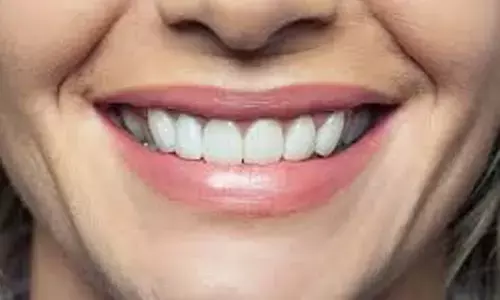- Home
- Medical news & Guidelines
- Anesthesiology
- Cardiology and CTVS
- Critical Care
- Dentistry
- Dermatology
- Diabetes and Endocrinology
- ENT
- Gastroenterology
- Medicine
- Nephrology
- Neurology
- Obstretics-Gynaecology
- Oncology
- Ophthalmology
- Orthopaedics
- Pediatrics-Neonatology
- Psychiatry
- Pulmonology
- Radiology
- Surgery
- Urology
- Laboratory Medicine
- Diet
- Nursing
- Paramedical
- Physiotherapy
- Health news
- Fact Check
- Bone Health Fact Check
- Brain Health Fact Check
- Cancer Related Fact Check
- Child Care Fact Check
- Dental and oral health fact check
- Diabetes and metabolic health fact check
- Diet and Nutrition Fact Check
- Eye and ENT Care Fact Check
- Fitness fact check
- Gut health fact check
- Heart health fact check
- Kidney health fact check
- Medical education fact check
- Men's health fact check
- Respiratory fact check
- Skin and hair care fact check
- Vaccine and Immunization fact check
- Women's health fact check
- AYUSH
- State News
- Andaman and Nicobar Islands
- Andhra Pradesh
- Arunachal Pradesh
- Assam
- Bihar
- Chandigarh
- Chattisgarh
- Dadra and Nagar Haveli
- Daman and Diu
- Delhi
- Goa
- Gujarat
- Haryana
- Himachal Pradesh
- Jammu & Kashmir
- Jharkhand
- Karnataka
- Kerala
- Ladakh
- Lakshadweep
- Madhya Pradesh
- Maharashtra
- Manipur
- Meghalaya
- Mizoram
- Nagaland
- Odisha
- Puducherry
- Punjab
- Rajasthan
- Sikkim
- Tamil Nadu
- Telangana
- Tripura
- Uttar Pradesh
- Uttrakhand
- West Bengal
- Medical Education
- Industry
Immune-regulating drug Rapamycin may improve gum disease

An Immune-regulating drug Rapamycin may improve gum disease.The drug has life-extending effects on mice and may also reverse age-related dental problems in the animals, according to a new study published today in eLife.
Periodontal disease, also known as gum disease, is a common problem in older adults that causes painful inflammation, bone loss and changes in the good bacteria that live in the mouth. Yet there are no treatments available beyond tooth removal and/or having good oral hygiene. The findings suggest that treatments targeting the aging process in the mouth might help.
Rapamycin is an immune-suppressing drug currently used to prevent organ rejection in transplant recipients. Previous studies in mice have also suggested that it may have life-extending effects, which has led to interest in studying the drug's effects in many age-related diseases.
"We hypothesised that biological aging contributes to periodontal disease, and that interventions that delay aging should also delay the progress of this disease," says lead author Jonathan An, Acting Assistant Professor at the Department of Oral Health Sciences, University of Washington, Seattle, US.
To find out if rapamycin might slow periodontal disease, An and his colleagues added the drug to the food of middle-aged mice for eight weeks and compared their oral health with untreated mice of the same age. Similar to humans, mice also experience bone loss, inflammation and shifts in oral bacteria as they age.
Using a 3D-imaging technique called micro-computed tomography, the team measured the periodontal bone, or bone around the tooth, of the rapamycin-treated and untreated mice. They showed that the treated mice had more bone than the untreated mice, and had actually grown new bone during the period they were receiving rapamycin.
The work also showed that rapamycin-treated mice had less gum inflammation. Genetic sequencing of the bacteria in their mouths also revealed that the animals had fewer bacteria associated with gum disease and a mix of oral bacteria more similar to that found in healthy young mice.
"By targeting this aging process through rapamycin treatment, our work suggests that we can delay the progress of gum disease and actually reverse its clinical features," explains senior author Matt Kaeberlein, Professor of Pathology and Adjunct Professor of Oral Health Sciences at the University of Washington.
However, Kaeberlein adds that while rapamycin is already used to treat certain conditions, it can make people more susceptible to infections and may increase their risk of developing diabetes, at least at the higher chronic doses typically taken by organ transplant patients. "Clinical trials in humans are needed to test whether rapamycin's potential oral health and other benefits outweigh its risks," he concludes.
For more details click on the link: http://dx.doi.org/10.7554/eLife.54318
Hina Zahid Joined Medical Dialogue in 2017 with a passion to work as a Reporter. She coordinates with various national and international journals and association and covers all the stories related to Medical guidelines, Medical Journals, rare medical surgeries as well as all the updates in the medical field. Email: editorial@medicaldialogues.in. Contact no. 011-43720751
Dr Kamal Kant Kohli-MBBS, DTCD- a chest specialist with more than 30 years of practice and a flair for writing clinical articles, Dr Kamal Kant Kohli joined Medical Dialogues as a Chief Editor of Medical News. Besides writing articles, as an editor, he proofreads and verifies all the medical content published on Medical Dialogues including those coming from journals, studies,medical conferences,guidelines etc. Email: drkohli@medicaldialogues.in. Contact no. 011-43720751


